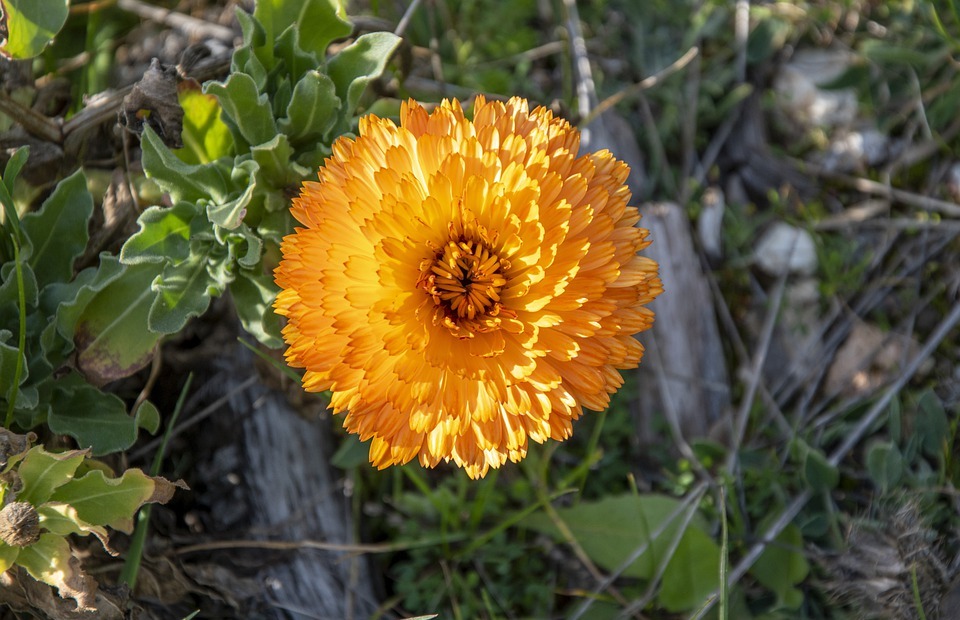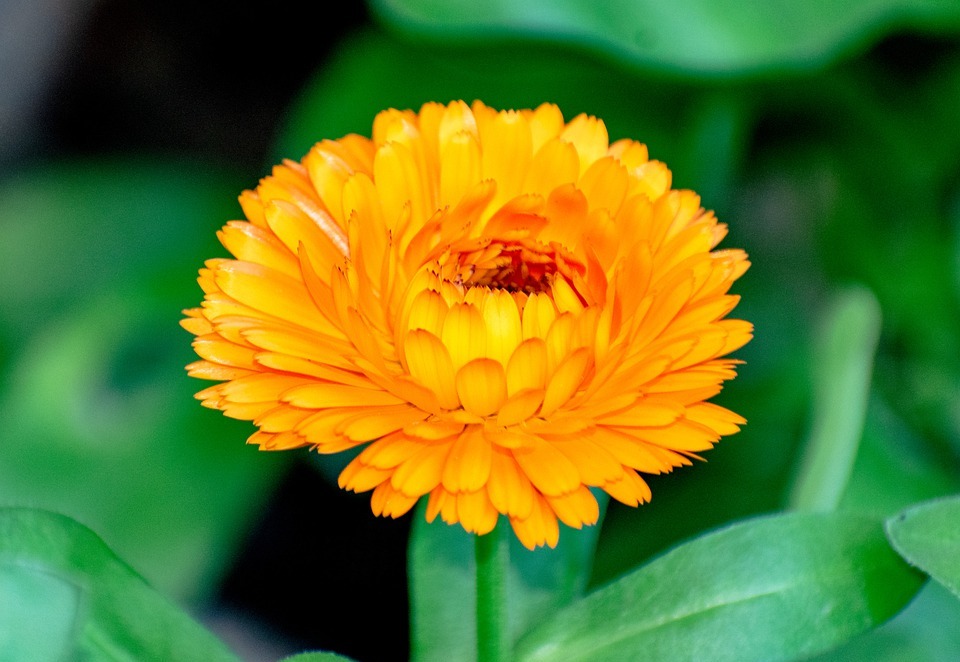This article delves into the world of marigolds and their purported ability to deter rabbits from your garden. We’ll examine the science behind this claim, explore various marigold varieties and their associated scents, and provide practical tips for planting these flowers for optimal rabbit control. Additionally, we’ll explore alternative methods to protect your garden from these furry nibblers, discuss the limitations of using marigolds alone, and address common questions about these vibrant blooms.
Part 1: The Science of Marigolds and Rabbits

1.1. Marigold Scent and Rabbit Behavior
Rabbits rely heavily on their sense of smell for navigating their surroundings, locating food sources, and detecting predators. Their noses are incredibly sensitive, allowing them to smell things humans cannot. The distinctive, pungent aroma of marigolds, particularly African marigolds (Tagetes erecta), is believed to be unpleasant to rabbits. This strong scent, attributed to compounds like terpenes and thiophenes, may act as a deterrent, influencing their foraging decisions.
1.2. The Role of Taste in Rabbit Repellency
While marigolds’ scent is often cited as the primary deterrent, their taste also plays a role. Rabbits are known for their picky eating habits and generally avoid bitter or pungent tasting plants. The compounds responsible for marigolds' strong aroma are often associated with a bitter taste, further contributing to their unpalatability to rabbits.
1.3. The Need for More Research
While anecdotal evidence and traditional gardening practices widely suggest that marigolds repel rabbits, scientific research directly evaluating their efficacy is limited. Studies have proven that some plants, like garlic and onions, contain compounds that can deter rabbits. However, more comprehensive studies specifically focusing on the effectiveness of marigolds as rabbit repellents are needed to solidify these claims.
Part 2: Marigold Varieties and their Rabbit-Repelling Potential

2.1. African Marigold (Tagetes erecta): The Strongest Scent
African marigolds are renowned for their large, vibrant flowers and their powerful, pungent aroma. Their strong scent, often described as earthy and citrusy, is considered more potent than other marigold varieties, making them a popular choice for repelling various pests, including rabbits.
2.2. French Marigold (Tagetes patula): A Milder Scent
French marigolds, while smaller in size than their African counterparts, still possess a distinctive fragrance. Their scent is often described as milder and more delicate, though still noticeable. While their effectiveness against rabbits may be slightly less than African marigolds, they are still considered a valuable deterrent.
2.3. Signet Marigold (Tagetes tenuifolia): Delicate and Fragrant
Signet marigolds, also known as Mexican marigolds, offer a more delicate and citrusy fragrance, often described as lemon-like. They are commonly used as edging plants for their low-growing habit and attractive blooms. However, their subtle scent may not be strong enough to effectively deter all rabbits.
Part 3: Planting Marigolds for Maximum Effectiveness
3.1. Strategic Placement: Targeting Vulnerable Areas
To maximize the impact of marigolds as rabbit deterrents, strategic placement is crucial. Plant marigolds near susceptible plants, along garden borders, or in areas where rabbits are frequently observed. Creating a “ring” of marigolds around vulnerable crops can be particularly effective.
3.2. Dense Planting: Amplifying the Scent
Dense planting of marigolds can create a more concentrated scent, increasing their potential effectiveness. Plant them close together or create a solid border of marigolds around your garden. This creates a “wall” of scent, making it harder for rabbits to ignore.
3.3. Companion Planting: Synergistic Deterrents
Marigolds are often used in companion planting, attracting beneficial insects while repelling certain pests. Combining marigolds with other plants known to deter rabbits, such as lavender, rosemary, garlic, or onions, can create a more robust deterrent effect.
Part 4: Alternative Methods for Rabbit Control
While marigolds can be a valuable tool in your rabbit-proofing arsenal, relying on them alone may not be sufficient. Consider a multi-pronged approach that includes physical barriers, plant selection, and other deterrents.
4.1. Physical Barriers: Keeping Rabbits Out
Fencing is a reliable way to prevent rabbits from accessing your garden. Use a sturdy wire mesh fence with small openings (less than 1 inch) to prevent rabbits from squeezing through. Ensure the fence is buried underground to prevent them from digging underneath.
4.2. Plant Selection: Choosing Rabbit-Resistant Plants
Choose plant varieties that are naturally less appealing to rabbits. Some vegetables, fruits, and flowers have strong odors, tough textures, or bitter flavors that deter rabbits from nibbling on them.
4.3. Repellents: Chemical and Natural Options
Commercial rabbit repellents are available, containing ingredients like garlic, peppermint oil, or predator urine. These repellents need to be applied regularly to maintain their effectiveness. Natural alternatives include planting strong-scented herbs like rosemary, lavender, and thyme around your garden.
4.4. Human Intervention: Discouraging Rabbit Behavior
If rabbits are persistent, consider non-lethal deterrents like motion-activated sprinklers, ultrasonic devices, or even loud noises to discourage them from entering your garden. Remember to be humane and avoid trapping or harming these animals.
Part 5: Limitations of Marigold-Based Rabbit Control
While marigolds offer a promising approach to rabbit deterrence, they are not a foolproof solution.
5.1. Limited Scientific Proof: The Need for More Research
As mentioned earlier, scientific evidence supporting the effectiveness of marigolds as rabbit repellents is limited. Rabbits may adapt to the scent or simply ignore it if they are desperate for food.
5.2. Individual Rabbit Preferences: Not a Universal Repellent
Rabbits have individual preferences, and what deters one rabbit may not deter another. Some rabbits may be particularly sensitive to the marigold scent, while others may simply find it unappealing.
5.3. Environmental Factors: Impacting Scent Intensity
Factors like weather conditions, soil type, and plant health can influence the intensity of marigolds' scent. In dry, hot weather, the scent may be less potent, decreasing its effectiveness.
Part 6: Addressing Common Questions
6.1. Do marigolds work against all types of rabbits?
While marigolds may deter some rabbits, their effectiveness can vary depending on the species and individual preferences. While they may be effective against common garden rabbits, they may not deter larger, more aggressive rabbits, such as jackrabbits.
6.2. What is the best way to plant marigolds for rabbit control?
Plant marigolds densely around your garden, particularly near vulnerable plants. Consider companion planting with other rabbit-resistant species for enhanced deterrence.
6.3. How often should I replant marigolds?
Marigolds are typically annuals, meaning they live for one growing season. Replant them in the spring or summer to maintain their deterrent effect.
6.4. Are marigolds harmful to other animals?
Marigolds are generally non-toxic to most animals, including pets and livestock. However, they can be mildly irritating to some pets, so it's best to keep them out of reach of curious animals.
6.5. Are there any other plants that can repel rabbits?
Yes, there are several other plants that can deter rabbits, including lavender, rosemary, garlic, onions, and chives. These plants often contain compounds that rabbits find unpleasant or distasteful.
6.6. Can I use marigolds as a natural insecticide?
Yes, marigolds are known for their insecticidal properties. They release compounds that can deter certain pests, including aphids, whiteflies, and nematodes.
6.7. Do marigolds affect the taste of nearby vegetables?
Marigolds do not have a significant impact on the taste of nearby vegetables. The compounds responsible for their scent and taste are not readily transferred to other plants.
6.8. Can I use marigold extract or tea to repel rabbits?
Marigold extract or tea can be used as a natural repellent, but their effectiveness may be less than planting live marigolds due to the concentration of the active compounds. Use a spray bottle to apply the extract or tea around your garden.
By understanding the science behind marigold-based rabbit control and utilizing a combination of strategies, you can create a rabbit-resistant garden that protects your precious plants. Remember, while marigolds offer a promising approach, they are best used in conjunction with other deterrents for optimal effectiveness.
Everyone is watching
-

Do Rabbits Lay Eggs? (The Surprising Truth)
OTHER TYPES OF PETSThis article will unravel the common misconception that rabbits lay eggs, exploring the fascinating world of r...
-

Can Rabbits Eat Grapes? A Guide to Safe Rabbit Treats
OTHER TYPES OF PETSThis comprehensive guide will explore the safety and suitability of grapes for rabbits, providing detailed inf...
-

What's a Group of Rabbits Called? (A Comprehensive Guide)
OTHER TYPES OF PETSThis article delves into the fascinating world of rabbits, exploring the various terms used to describe a grou...
-

Predators That Hunt Rabbits: A Guide to Natural Enemies
OTHER TYPES OF PETSI've always been fascinated by the circle of life, that delicate dance between predator and prey. Growing up ...
-

Are Rabbits Nocturnal Animals?
OTHER TYPES OF PETSThe question of whether rabbits are nocturnal animals is a fascinating one, with a surprisingly complex answer...
